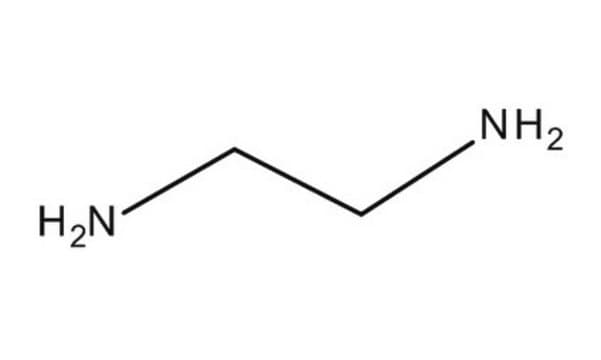418099
Benzaldehyde
purified by redistillation, ≥99.5%
Synonym(s):
Bitter almond
About This Item
Recommended Products
vapor density
3.7 (vs air)
Quality Level
vapor pressure
4 mmHg ( 45 °C)
Assay
≥99.5%
form
liquid
autoignition temp.
374 °F
purified by
redistillation
expl. lim.
1.4 %, 20 °F
refractive index
n20/D 1.545 (lit.)
pH
5.9 (20 °C)
bp
178-179 °C (lit.)
mp
−26 °C (lit.)
density
1.044 g/cm3 at 20 °C (lit.)
SMILES string
O=Cc1ccccc1
InChI
1S/C7H6O/c8-6-7-4-2-1-3-5-7/h1-6H
InChI key
HUMNYLRZRPPJDN-UHFFFAOYSA-N
Looking for similar products? Visit Product Comparison Guide
General description
Application
- Cinnamaldehyde, cinnamic acid, ethyl cinnamate, benzoic acid, benzyl alcohol, benzyl benzoate and hydrobenzamide etc.
- Triphenylmethane derivatives by condensation with phenols, aromatic amines, and benzene. This reaction is useful for the production of malachite green dyes.
- Benzoylborane by reacting with borylmagnesium bromides.
- Multi-benzaldehyde functionalized poly(ethylene glycol) analog which is used as a cross-linker to develop an injectable hydrogel system.
Signal Word
Danger
Hazard Statements
Precautionary Statements
Hazard Classifications
Acute Tox. 4 Inhalation - Acute Tox. 4 Oral - Aquatic Chronic 2 - Eye Irrit. 2 - Repr. 1B - Skin Irrit. 2 - STOT SE 3
Target Organs
Respiratory system
Storage Class Code
6.1C - Combustible acute toxic Cat.3 / toxic compounds or compounds which causing chronic effects
WGK
WGK 1
Flash Point(F)
145.4 °F - closed cup
Flash Point(C)
63 °C - closed cup
Personal Protective Equipment
Regulatory Listings
Regulatory Listings are mainly provided for chemical products. Only limited information can be provided here for non-chemical products. No entry means none of the components are listed. It is the user’s obligation to ensure the safe and legal use of the product.
PRTR
Class I Designated Chemical Substances
FSL
Group 4: Flammable liquids
Type 2 petroleums
Hazardous rank III
Water insoluble liquid
ISHL Indicated Name
Substances Subject to be Indicated Names
ISHL Notified Names
Substances Subject to be Notified Names
JAN Code
418099-100ML:
418099-500ML:
900046-VAR:
418099-VAR:
418099-5L:
418099-PZ:
418099-BULK:
Certificates of Analysis (COA)
Search for Certificates of Analysis (COA) by entering the products Lot/Batch Number. Lot and Batch Numbers can be found on a product’s label following the words ‘Lot’ or ‘Batch’.
Already Own This Product?
Find documentation for the products that you have recently purchased in the Document Library.
Customers Also Viewed
Our team of scientists has experience in all areas of research including Life Science, Material Science, Chemical Synthesis, Chromatography, Analytical and many others.
Contact Technical Service












